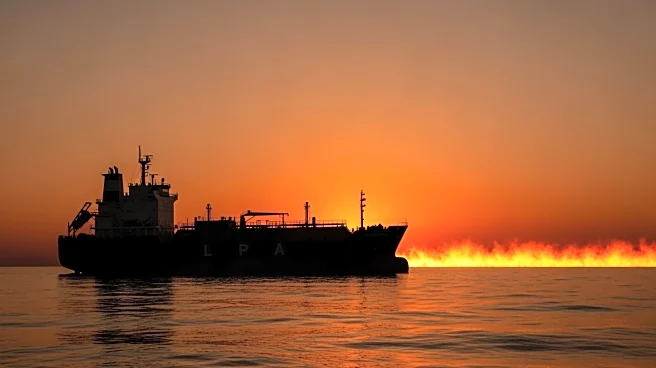What's Happening?
A Cameroon-flagged LPG carrier, identified as the Falcon, issued a distress call on October 18 while sailing near Yemen due to an explosion and fire onboard. The vessel, owned by an Indian company, reported the incident approximately 130 miles southeast
of Aden. EUNAVFOR Aspides is coordinating a search and rescue operation, deploying a Greek frigate and French air assets. The ship, which has a history of safety deficiencies, is now abandoned and drifting, with 15 percent of it involved in the fire. The crew of 26, including one Ukrainian and 25 Indians, abandoned the ship, with 24 rescued by passing vessels. One crew member remains aboard, and another is missing. The incident has raised suspicions of a Houthi militant attack, although the group has not commented.
Why It's Important?
The incident highlights ongoing security challenges in the Gulf of Aden, a critical maritime route for global trade. The potential involvement of Houthi militants underscores regional tensions and risks to shipping operations. The vessel's history of safety deficiencies raises concerns about maritime safety standards and the enforcement of regulations. The disruption could impact shipping schedules and insurance costs, affecting stakeholders in the shipping industry. The geopolitical implications are significant, as the region is a hotspot for conflicts involving various state and non-state actors.
What's Next?
EUNAVFOR Aspides continues to monitor the situation and coordinate rescue efforts. The investigation into the cause of the explosion and fire will be crucial in determining whether it was an accident or an attack. Shipping companies operating in the region may need to reassess security measures and routes to mitigate risks. The incident could prompt international maritime authorities to review safety protocols and inspection standards for vessels operating in high-risk areas.
Beyond the Headlines
The incident may lead to increased scrutiny of vessels with poor safety records, potentially influencing regulatory changes in maritime safety standards. The geopolitical dynamics in the region could shift, affecting diplomatic relations and military strategies. The humanitarian aspect, involving the safety and welfare of seafarers, may gain attention, prompting calls for better protection and support for crews in conflict zones.














